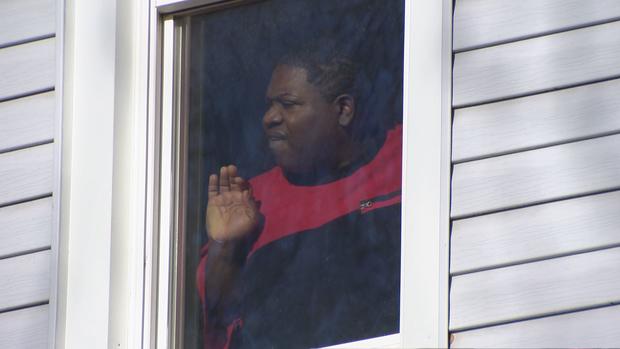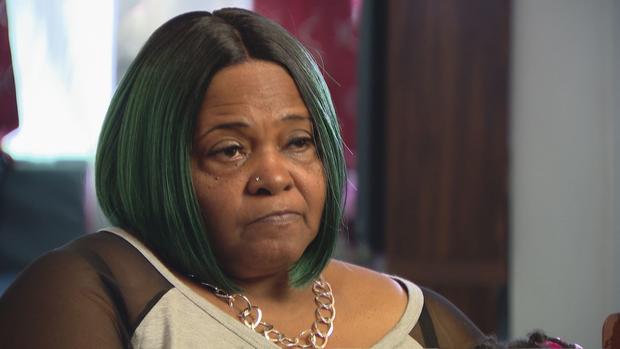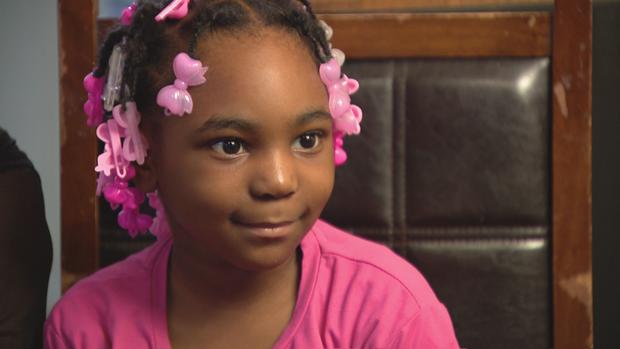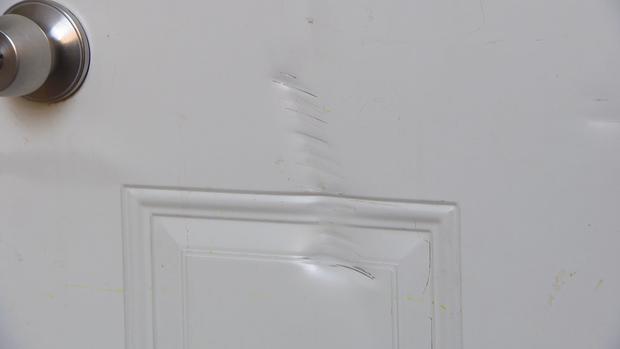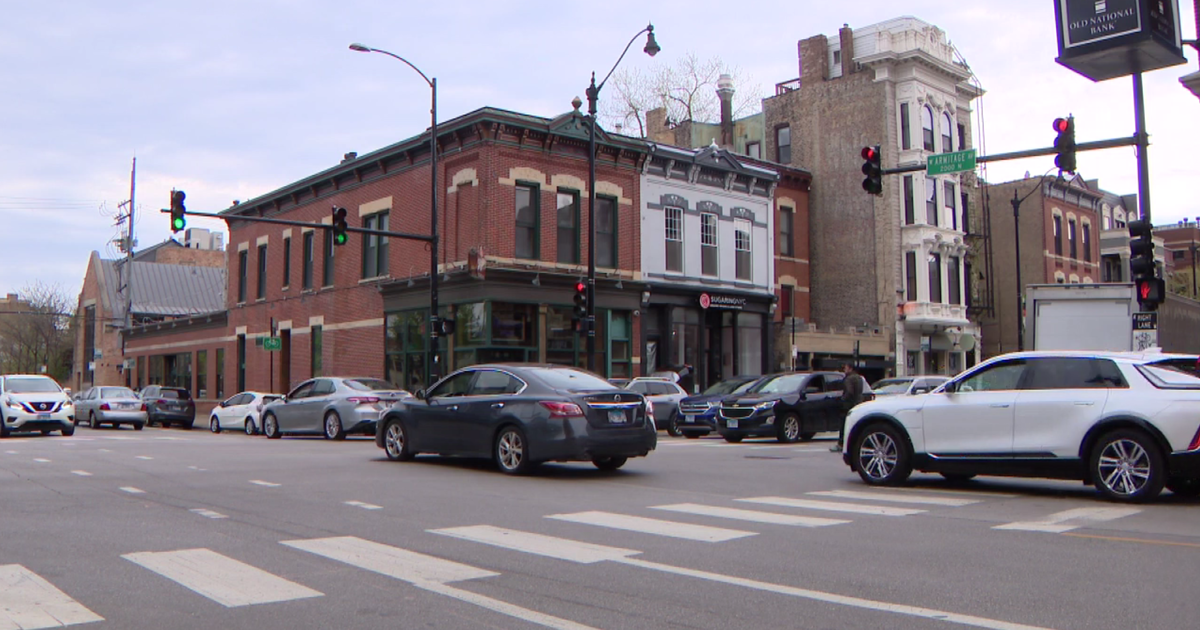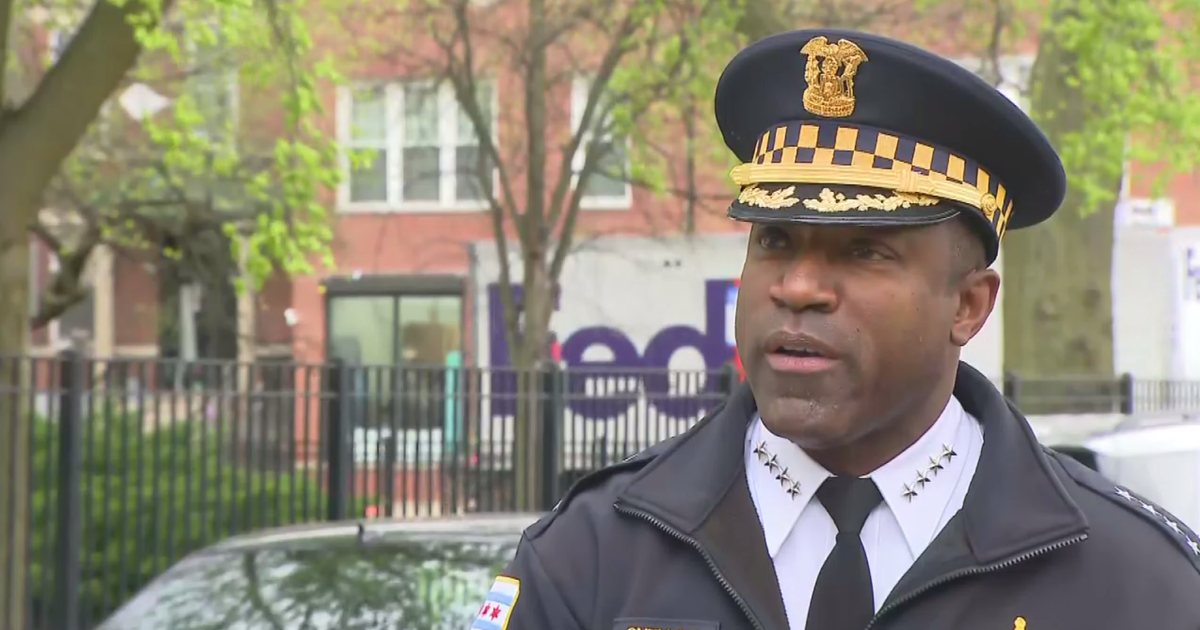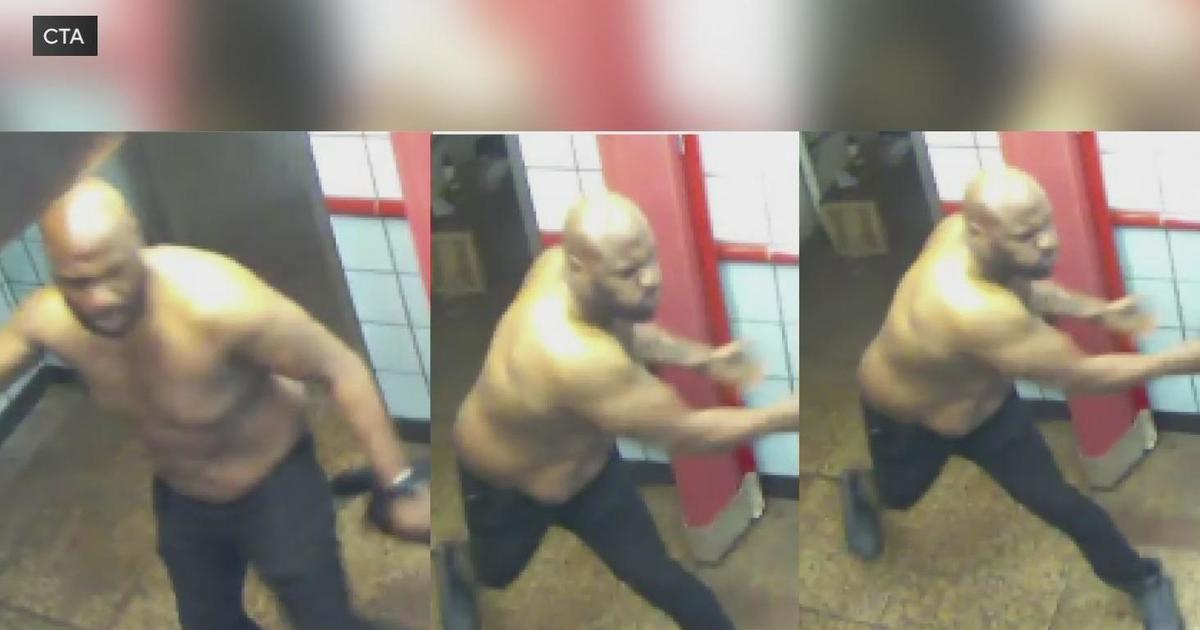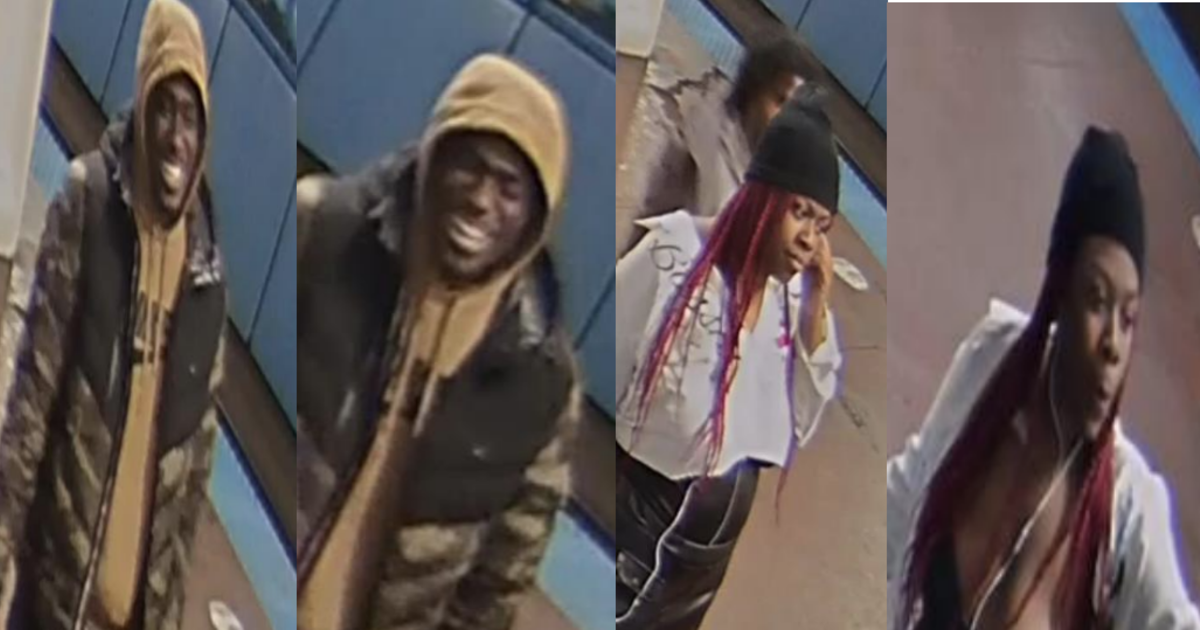'They Had The Guns Pointed At Me;' Another Chicago Family Wrongly Raided, Just 1 Month After Police Created Policy To Stop Bad Raids
CBS 2 analysis of police data finds Black and Latino neighborhoods disproportionately targeted in search warrants
By Dave Savini, Samah Assad, Michele Youngerman
CHICAGO (CBS) — Guns with flashlights were the first things Sharon Lyons saw when the Chicago Police broke down her door.
It was 6:18 p.m. Just moments before, she was in the kitchen of her two-bedroom apartment in the Back of the Yards neighborhood.
"The next thing I knew, the whole panel to my door came flying down," Sharon said.
Her 4-year-old granddaughter Lillie was sleeping in another room. Also home were her sons 32-year-old Timothy, 35-year-old James and 30-year-old Julius, who has autism.
Julius ran toward his mother in the kitchen when police burst in.
"Get down, get down, get down!" Julius remembered, describing how the officers shouted as police barreled through the door with guns drawn.
"They had the guns pointed at me, telling me to get down," Sharon said. "I got down. I keep asking them, 'What's going on? Please tell me what's going on.' I've never been through nothing like this. They just kept saying they had a search warrant."
As the family hit the floor, they heard Lillie's screams from the bedroom, where she had been sleeping. She was alone, as officers began to search the apartment. The family said the raid team wouldn't let them get to her.
"And I just heard [Lillie] start screaming," James said, tearfully. "She was so helpless at the time, no one could help her."
Sharon said she saw officers point guns toward Lillie as they entered the bedroom.
CBS 2 Investigator Dave Savini asked the 4-year-old if police pointed guns at anyone during the raid. She pointed to her grandmother and replied, "At her and me."
It was Feb. 26 when police went before a judge and swore the information in their complaint for the search warrant was accurate. It was signed by an assistant state's attorney at 2:37 p.m. Hours later, officers broke down Sharon's door – the wrong door – looking for someone the family said they don't know.
Just over a month earlier, in an interview, police officials committed to stopping bad raids like these from happening. Prompted by CBS 2's ongoing investigation, the department changed its search warrant policy to ensure additional oversight with search warrant approval and more protections for children, like Lillie.
"We don't want to see that happen," said Lt. Matthew Cline in an interview with CBS 2 Investigator Dave Savini on Jan. 23. "We don't want to erode the trust within the community."
But it happened again – this time, to the Lyons.
The country is reeling after the deaths of George Floyd, killed when a Minneapolis police officer knelt on his neck, and Breonna Taylor, also killed by Louisville police during a bad raid. Their deaths reignited critical questions about police misconduct in Chicago, as cities are forced to reckon with decades of racist policing.
And for the first time, CBS 2 obtained police search warrant data after nearly two years of Freedom of Information Act (FOIA) requests. While it offers a glimpse at how often Chicago Police officers execute search warrants overall, it also reveals a disturbing pattern about which neighborhoods are targeted the most. In addition, it shows how police failed to make arrests, or recover guns or drugs, in thousands of cases.
'We're the Targets — Black People'
What happened to the Lyons is emblematic of more than a dozen innocent families, and more than two dozen children, whose homes CBS 2 found were wrongly raided by the Chicago Police.
Each instance follows a similar pattern of allegations: guns pointed at families and often at children, destruction of personal property with a lack of follow-up, and black or Latino families being on the other end of the door.
Since 2018, CBS 2 sought records that would show the frequency of wrong raids. Then Superintendent Eddie Johnson claimed they track it. But by 2019, officials admitted that isn't the case.
Our nearly two-year FOIA battle for records from police uncovered they do, however, have a database documenting every search warrant executed and the outcome. It's the closest the public can get to understanding how the department uses search warrants as a policing tool. We obtained those records and found concerning racial disparities.
According CBS 2's analysis of the data, police executed 6,855 search warrants from 2016 to 2019. For this analysis, CBS 2 only included records that indicated a search warrant was served at a residence.
Although police redacted the full addresses, CBS 2 was able to map the warrants by blocks. This revealed Chicago Police disproportionately execute search warrants in majority Black and Latino neighborhoods. We learned many of the wrong raids we uncovered happened in these same communities.
Zoom in and click on the points in the maps below to explore which neighborhoods police served the most search warrants. Size indicates amount of warrants. Color indicates percent Black or Latino populations.
The five neighborhoods with the most search warrants are also those with nearly 90 percent or more Black and Latino populations. They are:
- Englewood: With 872 search warrants, it tops the list. It's also the community where Sharnia Phillips was wrongly raided in 2017. She said police used a tank and rammed the door. "I could have been killed," she said.
- Austin: 668.
- North Lawndale: 455. Here, the Blassingames' home was wrongly raided by police in 2015. The man officers were looking for didn't live there and had been in prison for years on a murder conviction. Two years later, another home was wrongly raided in this neighborhood. This time it was the apartment of Demetrius Labon and his sister Nishawn Green. In police body camera video, Labon can be heard yelling to police that they are in the wrong place. He later said in interview: "We're the targets – black people."
- Garfield Park: 442.
- Humboldt Park: 376. The wrong raid on then 3-year-old Davianna Simmons' home happened here. She now suffers from PTSD.
In contrast, we found neighborhoods with majority white populations, had the least search warrants executed. CBS 2's mapping analysis found no search warrants served in communities like Edison Park, Printers Row, Wrigleyville, Museum Campus and Magnificent Mile, among others, in the timeframe reviewed. These communities have white populations of 50 percent or more, census data shows.
CBS 2's half hour documentary, "[un]warranted", examined the emotional toll these incidents take on communities of color. And the recent wrong raid on the Lyons' home appears to be no different. The family lives in Back of the Yards, a majority Black and Latino community, where 290 search warrants were executed -- the seventh highest total for any neighborhood.
The family is represented by attorney Al Hofeld, Jr. who has filed a federal lawsuit in the case.
The Search for 'Blondie'
Like many of the families CBS 2 interviewed, the Lyons family said they don't understand how police ended up on their doorstep.
According to the complaint for search warrant, police were looking for a person officers only knew by the name of "Blondie." A paid confidential informant told police they saw "Blondie" selling heroin at the family's address, records show. In these documents police described the target as "a black transgendered woman" with a "medium length blonde wig," who weighs 150 pounds and is between 5 foot 7 inches and 5 foot 9 inches tall.
Other than driving the informant past the building, police documents show they did not take any additional steps to independently verify the informant's tip, such as surveillance, property records checks or any other research. That, despite police's commitments to more training and oversight on the process with its new policy just one month earlier.
"We're making sure that if we know children to be present, that in our operational planning, that's discussed that there's going to be children there," police Lt. Matthew Cline said.
The Lyons denied knowing or living with anyone who fits the description of "Blondie."
The family said they asked repeatedly to see the warrant, but police didn't provide it until the raid was over.
"[Officers] just pointing guns at everybody, like you don't even have valuable information to be coming up in here, so you don't who's in here," James said.
CBS 2's analysis of police data also found the neighborhoods with the most search warrants, like the Back of the Yards, were also those that had the most "negative" results. A negative raid is one where police did not make an arrest, nor did they recover any drugs, guns or other property. The data shows 1 in 10 search warrants, or 679 total, were negative.
Zoom in and click on the points in the maps below to explore which neighborhoods police served the most negative search warrants. Size indicates amount of warrants. Color indicates percent Black or Latino populations.
While a negative search warrant does not necessarily mean a wrong raid occurred, many of the incidents we uncovered fall in that category.
That's what the Lyons family said happened to them – no one was arrested, and police didn't find or recover any drugs. Police declined to comment or provide basic information about the raid to CBS 2, citing an ongoing investigation into the incident by the Civilian Office of Police Accountability (COPA). They also would not comment on whether or not the officers involved in the raid are being investigated for any violations of the new policy.
"While we cannot comment on the specifics of this incident, the Chicago Police Department prioritizes the safety and welfare of all residents, including children," a CPD spokesperson said in a statement emailed to CBS 2. "Furthermore, the Department updated its search warrant policy earlier this year to ensure that if children are present, a sensitive approach will be taken to safeguard their physical and mental well-being to minimize trauma following the execution of a search warrant."
Because many of the wrong raids CBS 2 uncovered ended in a negative outcome, we wanted to know how often police actually find what they're looking for when conducting a search warrant.
About 72 percent of all warrants sought drugs – a total of 4,921. Of those, records show drugs were confiscated in only 221 cases. That's less than 5 percent.
The interactive visualization below represents search warrants executed by Chicago Police from 2016 to 2019. Toggle between various categories to learn more about how officers use search warrants as a policing tool. You can categorize the data by year, search warrant type, outcome and more.
The data also shows police were seeking guns in 1,445 out of the 6,558 search warrants. That's 21 percent. Of those, guns were recovered in 669 cases, or just over 46 percent of the time.
In 43 percent of search warrants, or nearly 3,000, police did not make an arrest.
The wrong raids on the Archie family in 2019 fall into that negative category. Their home was raided three times in four months last year. Chilling body camera video shows officers pointing guns at children as they begged not to be shot. Police then interrogated the children without an adult present. The complaint for search warrant indicated they were looking for drugs, but it turned out to be a negative warrant because the police had entered the wrong place.
"Please do not shoot me, please, please, please," one of the children cried out after they were forced to the ground.
This allegation of excessive force and police misconduct echoed similar accusations families made when their homes were wrongly raided. In an interview conducted in March, James Lyons said the same thing happened to him. With a gun pointed at his face, and while Lillie screamed from another room, he said an officer forced him to the ground and pressed a foot on his neck – an allegation eerily similar to what happened to George Floyd months later in Minneapolis.
"Gun in my face and everything, and then he threw me down on the ground, put his foot on my back and my neck, almost killed me," James said. "Because I was kind of sick at the time, and I could barely breathe."
Police records and data from the Invisible Institute show officers who frequently conduct search warrants also have a pattern of citizen complaints. In a three-year period, the dozen affiants, or lead officers, who conducted the most negative search warrants had a total of 116. Those same dozen officers have a combined 446 citizen complaints filed against them. This includes 118 for illegal searches and 92 for use of force. Only two complaints were sustained.
"If they did it to us," James said, "Then they'll do it again."
Accountability
Sharon Lyons said the wrong raid on her home in February continues to haunt her. She never thought her family would join the growing group of those wrongly raided and calling for accountability within the Chicago Police Department.
"The way I feel and what I'm going through right now, I feel their pain," she said. "I know what they've been through because I've been through the same thing. I can't sleep at night."
CBS 2 has not been able to confirm any department action against a police officer in connection with these cases.
In some cases, we found police did not initiate internal investigations until after our reports. In one case, the lead officer on a search warrant in 2017 was deposed in a wrong raids lawsuit. In the deposition two years later, the officer admitted no one from the police department questioned him, let alone disciplined him, in connection with the lack of investigative work he did before the raid.
As part of an interview on ranging topics with CBS 2, newly appointed Superintendent David Brown said he plans to address wrong raids by putting a system in place to track them.
"Yes, tracking is something I want to include along with measures on the front end to ensure we check, double check and triple check before we run a raid to ensure it's the right place," Brown said.
You can watch Brown's full interview about wrong raids below.
"Of course, we're going to make mistakes," Brown continued." We can't be making mistakes over and over without putting procedures and policies in place."
Despite some of the positive changes to the police department's policy, officials previously would not commit to tracking when officers put the incorrect address on the warrant, or use an incorrect address given to them by an informant without verification, and subsequently enter the wrong place. This means none of the incidents CBS 2 uncovered would be documented as wrong raids.
"There are things we can do, best practices on the front end," Brown said. "like not just trusting a confidential informant's information without corroboration.
"If you don't do them right," he added, "you rescind whatever trust you've earned."
For many families whose homes were wrongly raided, like the Lyons, they said their trust in police was diminished the moment officers burst through their doors. They still live with trauma left in the wake of their homes -- and safe spaces -- being violated.
"She's gonna remember," Sharon said of 4-year-old Lillie. "I know she's not going to forget it."
This story came to light after the Lyons family contacted us through the form below.
